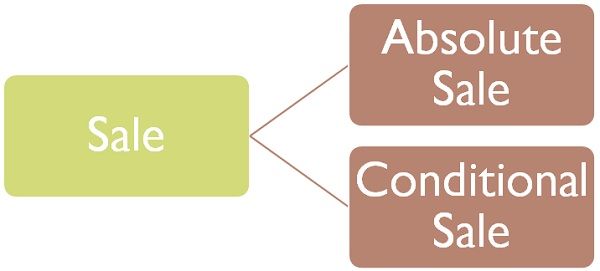

A ‘Contract of Sale‘ is a type of contract whereby one party (seller) either transfers the ownership of goods or agrees to transfer it for money to the other party (buyer). A contract of sale can be a sale or an agreement to sell. In a contract of sale, when there is an actual sale of goods, it is known as Sale whereas if there is an intention to sell the goods at a certain time in future or some conditions are satisfied, it is called an Agreement to sell.
Both sale and agreement to sell are types of contract, wherein the former is an executed contract whereas the latter represents an executory contract. Many law students get confused amidst these two terms, but these are not one and the same. Here, in the article given below, we’ve explained the difference between sale and agreement to sell, check it out.
| Basis for Comparison | Sale | Agreement to sell |
|---|---|---|
| Meaning | When in a contract of sale, the exchange of goods for money consideration takes place immediately, it is known as Sale. | When in a contract of sale the parties to contract agree to exchange the goods for a price at a future specified date is known as an Agreement to Sell. |
| Nature | Absolute | Conditional |
| Type of Contract | Executed Contract | Executory Contract |
| Transfer of risk | Yes | No |
| Title | In sale, the title of goods transfers to the buyer with the transfer of goods. | In an agreement to sell, the title of goods remains with the seller as there is no transfer of goods. |
| Right to sell | Buyer | Seller |
| Consequences of subsequent loss or damage to the goods | Responsibility of buyer | Responsibility of seller |
| Tax | VAT is charged at the time of sale. | No tax is levied. |
| Suit for breach of contract by the seller | The buyer can claim damages from the seller and proprietary remedy from the party to whom the goods are sold. | Here the buyer has the right to claim damages only. |
| Right of unpaid seller | Right to sue for the price. | Right to sue for damages. |
A sale is a type of contract in which the seller transfers the ownership of goods to the buyer for a money consideration. Here the relationship amidst the seller and buyer is of creditor and debtor. It is the result of an agreement to sell when the conditions are fulfilled and the specified time is over.

The following are the essential conditions regarding Sale:
If the goods are being sold and the property is transferred to the buyer, but the seller is not paid. Then, the seller can go to the court and file a suit against the buyer for the damages and the price too. On the other hand, if the goods are not delivered to the buyer then he can also sue the seller for damages.
An agreement to sell is also a contract of sale of goods, in which the seller agrees to transfer goods to the buyer for a price at a later date or after the fulfilment of a condition.
When there is a willingness of the both the parties to constitute a sale i.e. the buyer agrees to buy, and the seller is ready to sell the goods for monetary value. In an agreement to sell the performance of the contract is done at a future date, i.e. when the time elapses or when the necessary conditions are satisfied. After the contract is executed, it becomes a valid sale. All the necessary conditions required at the time of sale should exist in the case of an agreement to sell too.
If the seller rescinds the contract, then the buyer can claim damages for the breach of contract. On the other hand, the unpaid seller can also sue the buyer for damages.
The following are the major differences between sale and agreement to sell:
Under Indian Sale of Goods Act 1930, section 4 (3) deals with the contract of sale and agreement to sell, where it has been clarified that the agreement to sell also come under sale. However, there is a distinction between these two terms which we discussed above.
thank you very much it is precise to the point keep the good work & get tons of blessings if you should also have difference between CONDITIONAL SALE & ABSOLUTE SALE WITH MERITS & DEMERITS thanks once again
Hi. Thanks a lot or your work.
I’m just wondering if it is possible, in an agreement to sell, for the buyer to use the goods even when the conditions are not yet fully satisfied? In other words, in an agreement to sell, can the buyer use the goods/property without the having the title of ownership.
Awesome! Thank you so much for the much-respected Info. greatly appreciate it..
warm regards and thanks once again…